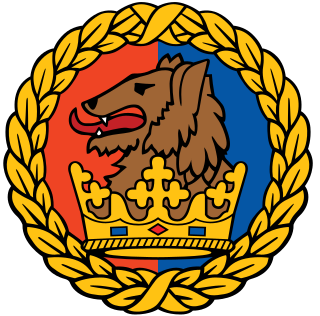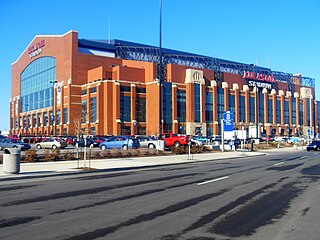Related Research Articles

The National Football League (NFL) is a professional American football league that consists of 32 teams, divided equally between the American Football Conference (AFC) and the National Football Conference (NFC). The NFL is one of the major professional sports leagues in the United States and Canada and the highest professional level of American football in the world. Each NFL season begins with a three-week preseason in August, followed by the 18-week regular season which runs from early September to early January, with each team playing 17 games and having one bye week. Following the conclusion of the regular season, seven teams from each conference advance to the playoffs, a single-elimination tournament that culminates in the Super Bowl, which is contested in February and is played between the winners of the AFC and NFC championship games.

The Atlantic Coast Conference (ACC) is a collegiate athletic conference located in the United States. Headquartered in Charlotte, North Carolina, the ACC's fifteen member universities compete in the National Collegiate Athletic Association (NCAA)'s Division I. ACC football teams compete in the NCAA Division I Football Bowl Subdivision. The ACC sponsors competition in twenty-seven sports with many of its member institutions held in high regard nationally. Current members of the conference are: Boston College, Clemson, Duke, Florida State, Georgia Tech, Louisville, Miami, North Carolina, NC State, Notre Dame, Pittsburgh, Syracuse, Virginia, Virginia Tech, and Wake Forest.

The Big East Conference was a collegiate athletics conference that consisted of as many as 16 universities in the eastern half of the United States from 1979 to 2013. The conference's members participated in 24 NCAA sports. The conference had a history of success at the national level in basketball throughout its history, while its shorter football program, created by inviting one college and four other "associate members" into the conference, resulted in two national championships.

The Big Ten Conference is the oldest Division I collegiate athletic conference in the United States. Founded as the Intercollegiate Conference of Faculty Representatives in 1896, it predates the founding of its regulating organization, the NCAA. It is based in the Chicago area in Rosemont, Illinois. For many decades the conference consisted of 10 prominent universities, which accounts for its name. As of 2014, it consists of 14 member institutions and 2 affiliate institutions, with 4 new member institutions scheduled to join in 2024. The conference competes in the NCAA Division I and its football teams compete in the Football Bowl Subdivision (FBS), formerly known as Division I-A, the highest level of NCAA competition in that sport.

The Pac-12 Conference is a collegiate athletic conference that operates in the Western United States, participating in 24 sports at the NCAA Division I level. Its football teams compete in the Football Bowl Subdivision, the highest level of college football in the nation.

The Mid-Eastern Athletic Conference (MEAC) is a collegiate athletic conference whose full members are historically black colleges and universities (HBCUs) in the Southeastern and the Mid-Atlantic United States. It participates in the National Collegiate Athletic Association's (NCAA) Division I, and in football, in the Football Championship Subdivision (FCS).

Chester City Football Club was an association football team from Chester, England, that played in a variety of leagues between 1885 and 2010. The club played its home games at Sealand Road from 1906 to 1991 and moved to the Deva Stadium in 1992 after playing two seasons of home games at Macclesfield Town's Moss Rose. Chester held cross-border derby matches with Welsh club Wrexham.

TED Conferences, LLC is an American-Canadian non-profit media organization that posts international talks online for free distribution under the slogan "ideas worth spreading". It was founded by Richard Saul Wurman and Harry Marks in February 1984 as a technology conference, in which Mickey Schulhof gave a demo of the compact disc that was invented in October 1982. Its main conference has been held annually since 1990. It covers almost all topics—from science to business to global issues—in more than 100 languages.

The 2006–07 NCAA Division I men's basketball season began on November 7, 2006, progressed through the regular season and conference tournaments, and concluded with the 2007 NCAA Division I men's basketball tournament championship game on April 2, 2007 at the Georgia Dome in Atlanta, Georgia. The Florida Gators successfully defended their national championship with an 84–75 victory over the Ohio State Buckeyes.
The ACC men's basketball tournament is the conference championship tournament in men's basketball for the Atlantic Coast Conference (ACC). It has been held every year since the ACC's first basketball season concluded in 1954. The ACC tournament is a single-elimination tournament and seeding is based on regular season records. The winner, declared conference champion, receives the conference's automatic bid to the NCAA men's tournament.

The 2007–08 NCAA Division I men's basketball season began on November 5, 2007 ended with the 2008 NCAA Division I men's basketball tournament's championship game on April 7, 2008, in the Alamodome in San Antonio, Texas.
The 2009–10 Football Conference season was the sixth season with the Football Conference consisting of three divisions, and the thirty-first season overall. The Conference covers the top two levels of Non-League football in England. The Conference Premier was the fifth highest level of the overall pyramid, while the Conference North and Conference South existed at the sixth level. The top team and the winner of the play-off of the National division were promoted to Football League Two. The bottom four were scheduled to be relegated to the North or South divisions, but in the event two teams were expelled and only the bottom two clubs were relegated with them. The champions of the North and South divisions were promoted to the National division, alongside the play-off winners from each division. The bottom three in each of the North and South divisions were relegated to the premier divisions of the Northern Premier League, Isthmian League or Southern League. For sponsorship reasons, the Conference Premier was frequently referred to as the Blue Square Premier.

The 2008–09 NCAA Division I men's basketball season began on November 10, 2008, and ended with the 2009 NCAA Division I men's basketball tournament's championship game on April 6, 2009, at Ford Field in Detroit, Michigan. The season saw six different teams achieve the AP #1 ranking during the year. Oklahoma sophomore Blake Griffin was the dominant individual performer, sweeping National Player of the Year honors. The season began with North Carolina becoming the first unanimous preseason #1 team, and ended with the Tar Heels dominating the NCAA tournament en route to their fifth NCAA title. UNC won its six NCAA tournament games by double digits, and by an average of 19.8 points per game. Junior Wayne Ellington was named Final Four Most Outstanding Player.

The 1999–2000 NCAA Division I men's basketball season began on November 11, 1999, with the Coaches vs. Cancer Classic, progressed through the regular season and conference tournaments, and concluded with the 2000 NCAA Division I men's basketball tournament championship game on April 3, 2000, at the RCA Dome in Indianapolis, Indiana.

The 2005–06 NCAA Division I men's basketball season began on November 6, 2005, progressed through the regular season and conference tournaments and concluded with the 2006 NCAA Division I men's basketball tournament championship game on April 3, 2006, at the RCA Dome in Indianapolis, Indiana. The Florida Gators won their first NCAA national championship with a 73–56 victory over the UCLA Bruins. This was the last Final Four site at the RCA Dome. The Final Four will return to the city of Indianapolis, but will be held at Lucas Oil Stadium.

The 2004–05 NCAA Division I men's basketball season began on November 10, 2004, progressed through the regular season and conference tournaments, and concluded with the 2005 NCAA Division I men's basketball tournament championship game on April 4, 2005 at the Edward Jones Dome in Saint Louis, Missouri. The North Carolina Tar Heels won their fourth NCAA national championship with a 75–70 victory over the Illinois Fighting Illini.

The 2009–10 NCAA Division I men's basketball season began on November 9, 2009, and ended with the 2010 NCAA Division I men's basketball tournament's championship game on April 5, 2010, on the Lucas Oil Stadium in Indianapolis. The opening round occurred on Tuesday, March 16, 2010, followed by first and second rounds on Thursday through Sunday, March 18–21, 2010. Regional games were played on Thursday through Sunday, March 25–28, 2010, with the Final Four played on Saturday and Monday, April 3 and 5, 2010.
The 2003–04 NCAA Division I men's basketball season began on November 10, 2003, progressed through the regular season and conference tournaments, and concluded with the 2004 NCAA Men's Division I Basketball Tournament Championship Game on April 5, 2004, at the Alamodome in San Antonio, Texas. The Connecticut Huskies won their second NCAA national championship with an 82–73 victory over the Georgia Tech Yellow Jackets.
The 2002–03 NCAA Division I men's basketball season began on November 10, 2002, progressed through the regular season and conference tournaments, and concluded with the 2003 NCAA Men's Division I Basketball Tournament Championship Game on April 7, 2003 at the Louisiana Superdome in New Orleans, Louisiana. The Syracuse Orange and coach Jim Boeheim won their first NCAA national championship with an 81–78 victory over the Kansas Jayhawks.
The 2001–02 NCAA Division I men's basketball season began on November 9, 2001, progressed through the regular season and conference tournaments, and concluded with the 2002 NCAA Men's Division I Basketball Tournament Championship Game on April 1, 2002 at the Georgia Dome in Atlanta, Georgia. The Maryland Terrapins won their first NCAA national championship with a 64–52 victory over the Indiana Hoosiers.
References
- ↑ "CNS Story: Organisms' common ancestry aids medical research, says biologist". Archived from the original on 10 March 2009. Retrieved 6 July 2011.